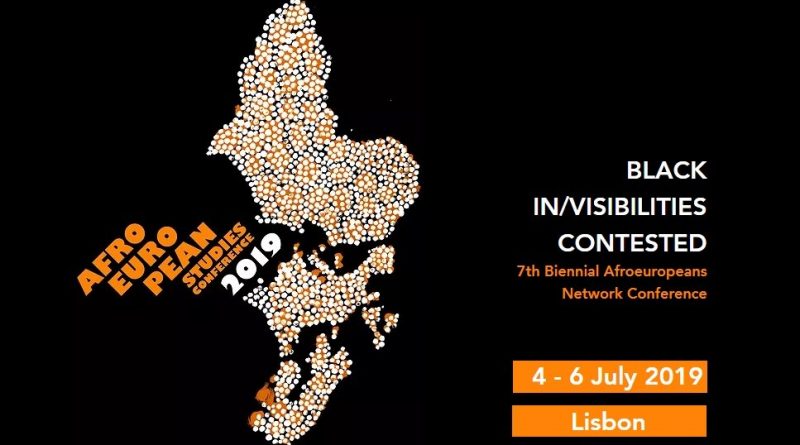4-6 JUL | 7th Biennial Network Conference Afroeuropeans
CEI-IUL co-organizes, in partnership with ISCTE-IUL, CIES-IUL, CES-UCoimbra, CEsA – Centro de Estudos sobre África, Ásia e América-Latina / U-Lisboa, CEC – Centro de Estudos Comparatistas / ULisboa, the 7th Biennial Network Conference: “Afroeuropeans: Black In/Visibilities Contested”, which will be held at ISCTE-IUL from July 4 to 6, 2019.
In addition to the academic discussion, the conference encompasses a cultural program in other places in Lisbon, such as TodoMundo – food, fun and art, Hangar – Artistic Research Center, Ferroviário, Casa Mocambo and the Quinta do Mocho neighborhood. More than 200 participants from around the world are expected to attend, focusing on the production of knowledge, culture and diversity of Afro-descendants in Europe, in order to discuss issues such as racism, representativeness, decolonization and new narratives about blackness in Europe.
For more informations about the conference and its detailed programme, please consult the conference website.
About the International Conference
The International Conference is an important platform for the production of knowledge in the pertinent field of transdisciplinary research on racism, black cultures and identities in Europe. It also offers the opportunity to strengthen and widen networks between scholars, activists and artists that question structural racism and are critically engaged with the production of postcolonial knowledge on european blackness and the african diaspora. This dialogue and networking is promoted through keynotes and panels, round-tables, individual speakers and artistic and cultural activities.
This conference is the result of a long collaboration between academics, writers and artists from many European universities and research institutes and from other parts of the world that gave rise to the international network “Afroeurope@s: Cultures and Black Identities in Europe”. With the aim of deepening the knowledge of black populations in Europe and their contribution to society in all areas of life, the network organized conferences in different European universities: University of León in 2006 and 2009; University of Cádiz in 2011; University of London and Open University in 2013; University of Münster in 2015 and University of Tampere in 2017. We are honored to bring this debate for the first time to Lisbon, a city with one of the largest African diasporas, which has influenced literature, music, language and the Portuguese society in general in the last five centuries. The local organizing committee is composed of researchers, artists and activists from different universities and collectives from Portugal, Brazil and Switzerland.
About the title of the conference
The title of the conference incorporates the tensions, ambiguities and paradoxes of Blackness in Europe. At the same time as black histories, cultures and social conditions are made invisible in hegemonic accounts on Europe, there is a hypervisibility and presence of black stereotyping in European popular culture. Also, while the concept of race has largely disappeared from political, sociological and administrative discourses (in continental Europe), and while the disengagement with institutional and structural racism has been reframed in new capitalist post racial rhetorics, racial markers still have currency, and black bodies continue to be invoked as either tolerated guests at best, or threatening intruders at worst. The consequence is the practice of “embodying an identity that is declared impossible even though lived by millions”, namely as non-white Europeans, and specifically as Black Europeans. This identity has become even more conditioned by a new mainstreaming of right-wing discourses and the tightening immigrant and refugee policies that affect people of African descent.
Topics to be discussed
The conference addresses not only these relations of domination, and racial modes of exclusion, but engages primarily with the continuous contestations and resistance these in/visibilities have gone by. We turn our gaze to the disregarded histories and cultures, and inquire past, new and continuous forms of Afroeuropean political, social, cultural and artistic interventions and resistance. This implies taking into account the different positionalities within European Blackness, linked for instance to diasporic origins, language, gender, social class, citizenship status, sexuality, dis/abilities, as well as the varying geo-spatial and post-colonial historical formations.
The conference programme is avaliable here.
Find out how to get to the conference here.
FREE ENTRY
![]() This work is licensed under a Creative Commons Attribution-NonCommercial-ShareAlike 4.0 International License.
This work is licensed under a Creative Commons Attribution-NonCommercial-ShareAlike 4.0 International License.




